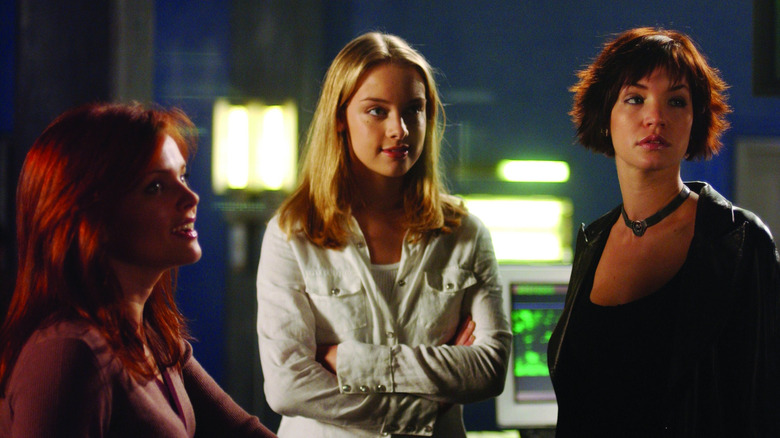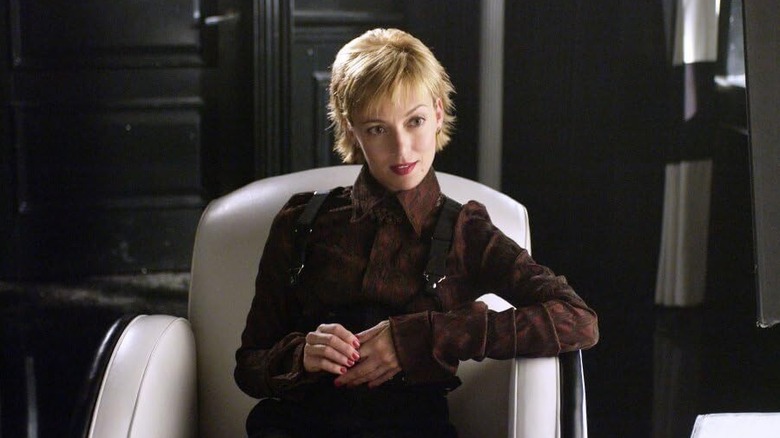Why The WB Canceled The Batman Spin-Off Series Birds Of Prey
Over a decade before the Arrowverse shows and their crossover events set the standard on The CW, its predecessor, The WB, was already experimenting with similar ideas involving multiple DC Comics superheroes teaming up to fight evil. On October 9, 2002, the network's "Birds of Prey" introduced a Batman-free version of Gotham City where crime runs rampant and familiar faces from the DC universe clash.
From a modern point of view, the show had a lot going for it. Its promo clips heavily suggested that its events existed in (a version of) the same continuity as the Tim Burton Batman movies — not that this stopped the series from briefly introducing a distinctly new version of the Joker, as voiced by none other than Mark Hamill. As its main character, "Birds of Prey" had Helena "Huntress" Kyle (Ashley Scott), the super-powered daughter of Catwoman and Batman. Teaming up with former Batgirl Barbara Gordon (Dina Meyer) — whose injury at the Joker's hands has left her paraplegic and led her to assume a new role as the mentor-like Oracle — and young newcomer Dinah "Black Canary" Redmond (Rachel Skarsten), Helena faces off with villains that include Dr. Harleen Quinzel (Mia Sara), who's well on her way to adopt her Harley Quinn persona.
Unfortunately, "Birds of Prey" didn't live up to its potential. The comic book show's ratings failed to impress network executives, and it ended up getting canceled before its first season was even over, leaving its total episode count at just 13.
The Birds of Prey didn't fly for long
For bat-fans of the era, the loss may have stung even worse because The WB had already established a very successful DC superhero show with "Smallville." The surprisingly enduring combination of small-town teen drama and high-stakes superhero shenanigans lasted so long that there was quite literally no more backstory to tell before young Clark Kent's (Tom Welling) transition to his dual roles as a reporter in Metropolis and Superman. Faced with this dilemma (and the fact that the series was bleeding actors toward the end, leaving Wellington the last original show regular standing), The CW canceled "Smallville" after season 10 — and even then, the series returned in comic book form for a honorary season 11.
In a rare instance of a Superman live-action project utterly crushing a Batman-adjacent one, it became obvious early on that "Birds of Prey" couldn't soar as high as "Smallville." While the show's premiere set the network's record in the 18-34 demographic with an impressive 7.6 million viewers, it turned out that the series couldn't sustain such figures — possibly because both critics and audiences felt that "Birds of Prey" was considerably worse than "Smallville." Thanks to rapidly plummeting ratings, the titular trio's adventures soon came to an end ... save for Scott's on-screen Huntress cameo in The CW's "Crisis on Infinite Earths" Arrowverse crossover in 2019.
Strangely, this isn't even the only time a live-action adaptation of the "Birds of Prey" IP has had a bad time. Cathy Yan's colorful, R-rated 2020 film "Birds of Prey" (starring Margot Robbie as Harley Quinn, Mary Elizabeth Winstead as Huntress, Jurnee Smollett-Bell as Black Canary, Ewan McGregor as Roman "Black Mask" Sionis, and many others) met a grim fate at the box office despite being one of the DC Extended Universe's best movies.

